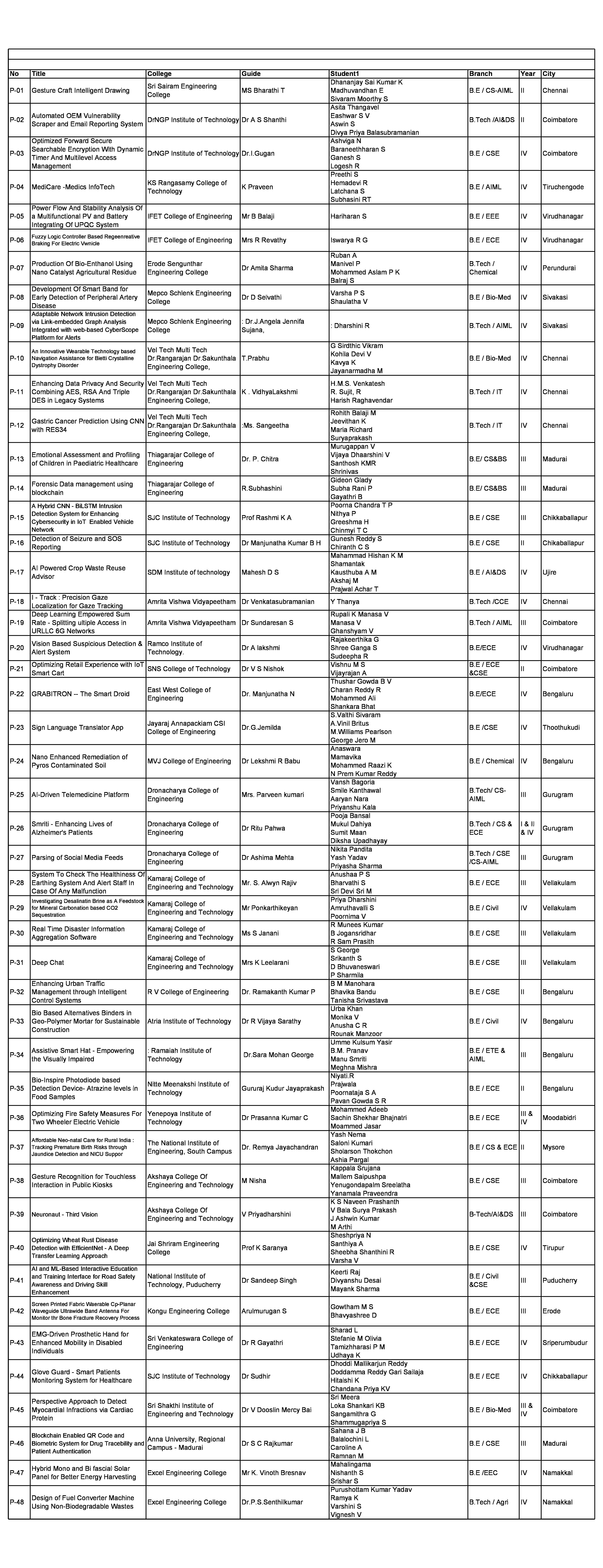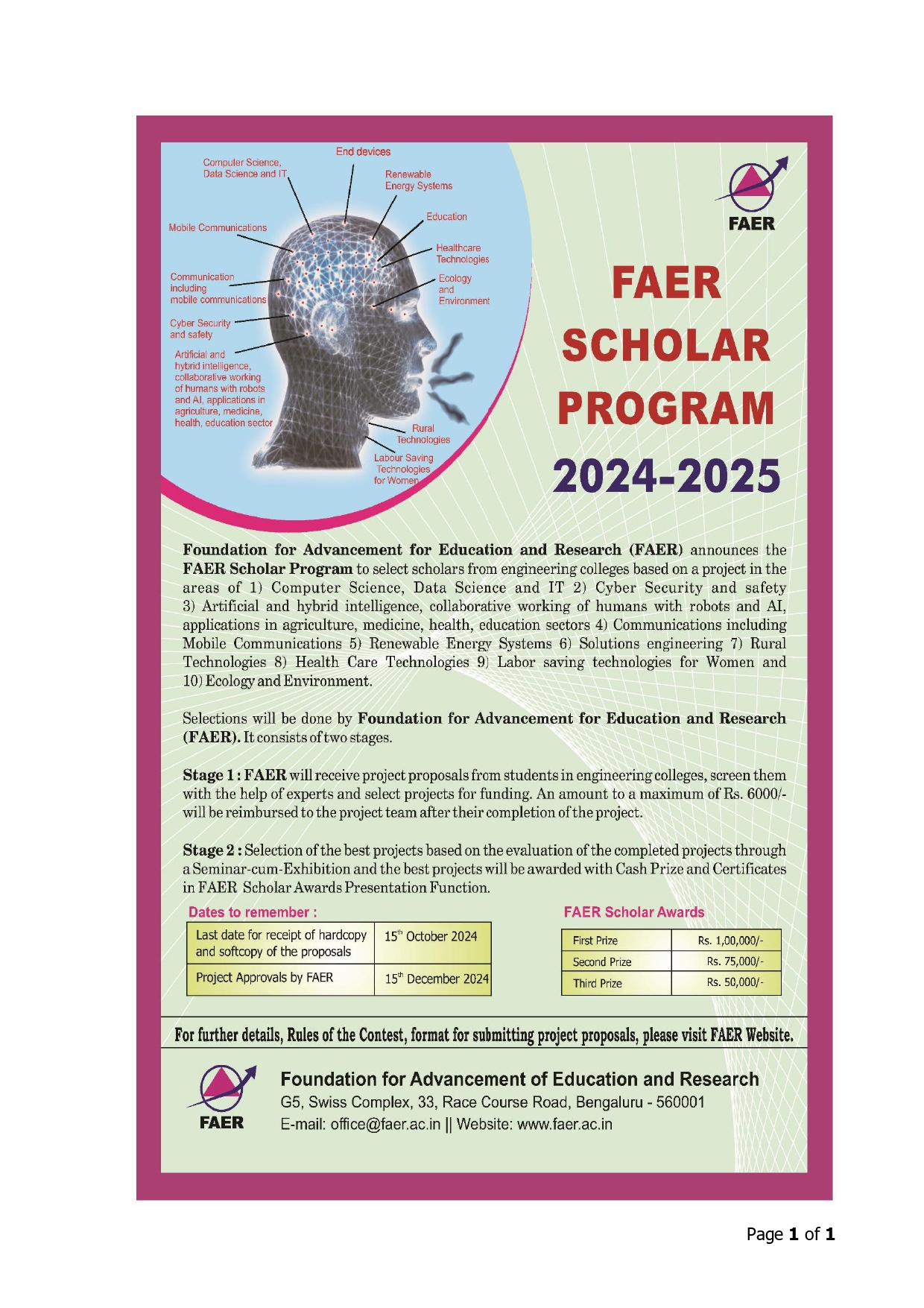FAER Scholar Awards 2024-25
Downloads & Resources
Learn More About The Program . Rules of the Contest . Proposal Format . Objectives . Agreement Letter Format
Message from the Secratary of FAER.
Projects Done by Engineering Students and the Expectations of FAERFAER has been conducting the scholar program for the past 17 years, with your continuous participation in this program. We express our gratitude for your encouragement and cooperation, as well as our appreciation to the faculty guiding the students. We aim to present our learnings and recommended actions for your review and subsequent follow-up.
Why Project Work for Engineering Students?
The significance of project activities undertaken by students is underscored
by various reasons:
A project undertaken during engineering studies offers a valuable opportunity to address a significant societal issue and develop a comprehensive solution through various stages, providing students with a holistic view.
It enables students to work autonomously and develop individual capabilities.
Project work instils a sense of ownership and responsibility in students.
It fosters collaboration and teamwork among students.
Project work exposes students to real-world problems, modern technologies, and the potential applications of technology in problem- solving.
Engaging in project work allows students to delve deeply into a particular topic.
Students encounter and overcome challenges and obstacles, boosting their confidence and enthusiasm.
Project work provides insights into various aspects of professionalism, documentation, design, experimentation, technology, and product availability.
Ultimately, project work contributes to students' sense of accomplishment and enhances their employability.
It is imperative for students to recognize and leverage the valuable opportunities presented by project work. Colleges and faculty members should acknowledge the importance of these initiatives and actively support and encourage students, aligning with the objectives of the National Education Policy (NEP).
Why is it Serious and Important This Time?
Over the past two decades, numerous innovations have emerged, leading to advancements in various technologies such as computers, cloud computing, data engineering, AI, communications, cyber systems, networked environments, instrumented systems, operations automation, GPUs, IoT, blockchain, terahertz RF, nanotechnology, AR, VR, and more. These advancements have reshaped our understanding of engineering, prompting the following changes:
Engineers are now expected to tackle complex and large-scale problems.
Solution methodologies are evolving.
Multiple technologies are integrated into a single application, exemplified by driverless cars that combine energy, mechanical, electrical, communications, imaging, edge and cloud computing, and AI technologies. This necessitates unlearning old concepts and acquiring new ones related to large systems, integrated systems, networking, complex systems, social aspects, and decision-making based on human intelligence, as we transition into a connected, networked, and automated world.
Engineering has transcended borders, requiring a multidisciplinary approach rather than focusing on individual disciplines.
These technological advancements offer vast opportunities across sectors like health, medicine, agriculture, education, transportation, conflict resolution, supply chain management, rural development, urban planning, security, and work models. Each sector presents numerous potential applications, necessitating the development of new models, solution methods, system architectures, security measures, and integration strategies. The future appears promising in light of these developments.
While colleges may face challenges in teaching all these technologies promptly, they are expected to adapt over time. Project work serves as a valuable opportunity for students to gain insight into this rapidly evolving technological landscape.
What FAER Expects from Students in their Project Activity
When students submit proposals for our scholar program, FAER looks for the following criteria in their project submissions:
Objectives:
Proposals should steer clear of generic and political statements and avoid claims like being cheaper than existing market products, as estimating marketing and logistic costs is complex. The title should be precise and indicative of the project's scope, avoiding overly general titles like "IOT for agriculture." Proposals should include a review of existing literature, market analysis, comparisons, and detailed experimental plans.
Projects should focus on technology integration and practical application rather than theoretical concepts.
Emphasis should be placed on modern technologies rather than traditional ones.
Students should approach their projects with seriousness and a clear understanding of their importance.
Projects centred on applications in fields such as medicine, agriculture, rural development, urban infrastructure, and transportation are encouraged.
Projects with a multidisciplinary approach are preferred.
The level of awareness and foundational knowledge of students in their chosen topic is important.
Avoid duplicating devices already available in the market.
Emphasize innovation over imitation.
Projects focusing on sectors like agriculture, medicine, transportation, and urban systems should identify experts and institutions/hospitals for consultation and verification of processes.
Utilize substantial data, particularly focusing on activities within India, utilizing the country's rich data sources rather than relying solely on internet sources.
Avoid excessive simulation, assumptions, and the use of tools.
Plan experiments to validate hypotheses rather than assuming everything will function as expected.
What FAER expects from you after the Selection of your proposal
After the selection of your proposal, FAER expects the following from you:
Maintain effective communication using email and online video meetings.
Regularly engage with your team, faculty, and mentor.
Choose a title for your project carefully.
Clearly define the scope of your work.
Develop action plans and adhere to them.
Obtain Indian datasets early on and identify consulting experts.
Define a focused scope for your problem that is achievable within the project timeline. we expect students to do their projects for a period of four to six months with an average time spent per week to be around 10 hours.
Follow all necessary steps, including preparing a problem description, literature review, device analysis, design and experiment planning, results analysis, and drawing conclusions. Experimentation is very important in a project. Remember it is not a construction activity.
Provide monthly progress reports that are specific and detailed.
Listen to your mentor's guidance and instructions.
Conduct dry runs and prepare thoroughly for the final project demonstration.
Submit a concise summary of your work for inclusion in the final FAER compendium. Additionally, provide a clear, visible video showcasing the functionality of your project upon completion.
Clearly articulate your motivation for undertaking the project and explain its significance to society.
Conduct research in your project area and highlight how your solution differs from existing alternatives.
If your innovation centers on cost reduction, explain how you achieve cost savings through the use of different materials, methodologies, processes, or other innovative approaches.
Expectations from Institutions by FAER
FAER expects the following from institutions participating in the scholar program:
Educate students on the significance of project work, fostering a positive work culture, and promoting teamwork.
Emphasize that the competition is open to all BE students, not solely limited to final year students. Encourage second- and third-year students to submit proposals as well.
Motivate students to engage in the scholar program.
Encourage and support students in submitting proposals for the program.
Assist students in the proposal writing process.
Review proposals and submit only high-quality ones for consideration.
Ensure there is no tolerance for plagiarism or any form of academic dishonesty.
Provide students with access to laboratory facilities to carry out their project work.
Facilitate communication between students and their mentors. Forward monthly reports from students to the appropriate channels.
Invitation to a One-Day Program in August 2024
We are excited to announce our upcoming one-day program in August or later 2024 focusing on "Effective Steps for Innovative Project Work by BE Students". This event is open to all faculty and students. If anyone is interested, he or she is requested to send an expression of interest at the earliest.
We warmly invite your students and faculty members to participate in this informative program. If you are interested in attending, kindly provide us with a list of names, years, departments, email addresses, and mobile numbers of those who wish to join. Please send this information to the FAER email address.
Thank you for your cooperation and we look forward to your active participation in this event.
About Scholar Awards Program
We are conducting the FAER scholar program to select and award "scholars" status to meritorious students from engineering colleges based on a project work with a rigorous three stage selection process referred and conducted by experts in the areas of
(1) Computer Science, Data Science & IT,
(2) Cyber Security & Safety,
(3) Artificial & Hybrid Intelligence, collaborative working of humans with robots
(5) Mobile Communications,
(5) Renewable Energy Systems,
(6) Solutions Engineering,
(7) Rural Technologies,
(8) Health Care Technologies,
(9) Labour saving Technologies ,
(10) Ecology and Environment
The objective of the FAER scholar program is to encourage creativity and innovation amongst the students in polytechnics and engineering institutions across India particularly those in rural and semi-urban areas making them to think and prepare detailed project proposals on areas and topics of relevance related to rural areas, rural communications, agricultural information systems, e-Governance, resource utilization, ecology, watershed development, renewable resources etc.,
Prize Amount
- First Prize : Rs. 100,000/- (Rs. 80,000 for the students team and Rs. 20,000 for the project guide)
- Second Prize : Rs. 75,000/- (Rs. 60,000 for the students team and Rs. 15,000 for the project guide)
- Third Prize : Rs. 50,000/- (Rs. 40,000 for the students team and Rs. 10,000 for the project guide)
Selection Process
Stage 1 : FAER will receive project proposals from students in engineering colleges, screen them with the help of experts and select projects for funding. An amount up to a maximum of Rs. 6,000/- will be reimbursed to each project team after completion of their project.
Stage 2 : Selection of "FAER -McAfee Scholars" based on the evaluation of the completed projects through a Seminar-cum-Exhibition and best projects will be awarded with Cash Prize and Certificates in FAER - McAfee Scholar Awards Presentation Function.
Dates to Remember :
Last date for receipt of hardcopy of the proposals for projects. Please send softcopy of the proposal by 15th October 2024. Email: office@faer.ac.in
Project Approvals by FAER. 15th December 2024.
The proposals duly certified by the project guide and Principal should reach FAER on or before 15th October 2024.
Foundation for Advancement of Education and Research
G5, Swiss Complex, 33, Race Course Road, Bengaluru - 560001


